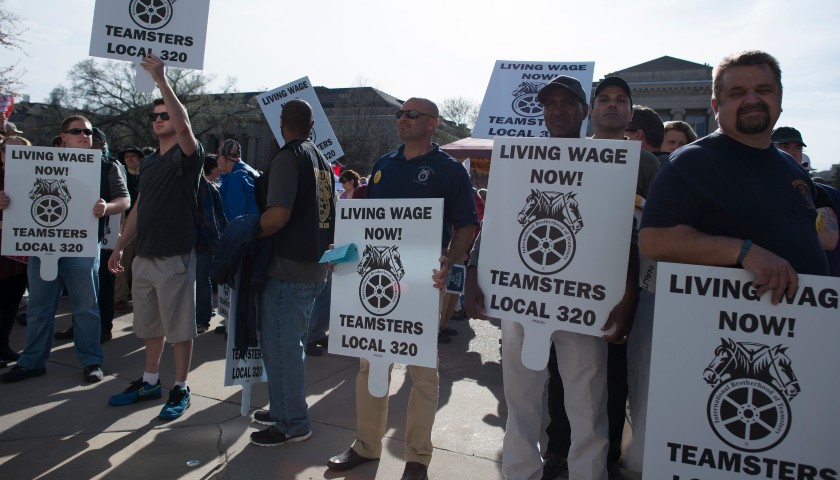by Bethany Blankley
If a $15 an hour minimum wage were implemented nationwide, more than 2 million jobs would be lost, according to a new report published by the nonprofit Employment Policies Institute (EPI).
The authors of the report – Dr. David Macpherson, professor at Trinity University, and Dr. William Even, professor in the Farmer School of Business at Miami University – conducted a state-by-state economic impact analysis including the impact of coronavirus unemployment and state shutdown data. The report also provides demographic-level estimates of the impact of raising the federal minimum wage to $15, comparing employment effects by age, sex, race and ethnicity, occupation type, and industry.
In 2019, the U.S. House of Representatives passed the Raise the Wage Act that, if enacted, would create an incremental schedule to increase the federal minimum wage to $15 an hour by 2027. The bill also would increase the federal tipped wage incrementally to reach $12.60 by 2027, an increase of 491 percent.
“This staggering rate of increase in the federal minimum wage is unprecedented,” the economists note, “and would have significant impact as businesses and employees seek to adjust to these rapidly changing wage floors. From 2000 to the present, the federal minimum rose by 41 percent. If enacted, the Raise the Wage Act dictates that the federal minimum will rise by 107 percent from 2020 to 2027.”
Democratic presidential candidate Joe Biden has endorsed the $15 minimum wage and the elimination of the tip credit. Of the 27 2020 Democratic candidates for president, 21 expressed support for raising the federal minimum wage, specifically to $15; two candidates endorsed raising it by a slightly lower amount.
Supporters say the cururent federal minimum wage of $7.25 an hour is not a living wage and it should be increased so lower-income families can pay for basic necessities.
President Donald Trump opposes the bill, saying it would be a jobs killer.
If a federal minimum tipped wage were enacted to reach $12.60 by 2027, 33 states would be required to raise their tipped wages by $8 or more in the next six years, the economists estimated, followed by further increases until it matches the regular minimum wage.
“Such growth could be considered unsustainable for many businesses, localities, and states,” they write.
The economists predicted that by 2027, Texas would lose the most jobs – more than 370,664. The next-highest losses would be in Pennsylvania, which could lose more than 143,000 jobs; followed by North Carolina, with more than 120,000 losses; Ohio, with roughly 108,312 losses; and Georgia, with roughly 106,427 losses.
Other hard-hit states include South Carolina (55,304 jobs lost), Alabama (53,227 jobs lost), Kentucky (54,954 jobs lost) and Iowa (33,080 jobs lost).
The economists used a methodology developed by the nonpartisan Congressional Budget Office (CBO), which published a report in 2019 on the impact of the legislation. The EPI report uses the CBO data and includes updated assumptions accounting for changes since 2019, specifically the economic impact of the COVID-19 outbreak.
“The crisis created by the spread of COVID-19 and subsequent shutdowns have severely affected employees and businesses, regardless of industry,” the executive summary of the report states. “The U.S. faced a 14.7 percent unemployment rate at its peak in April 2020, as a direct result of the virus outbreak, and although it has declined to 8.4 percent in the month of August, the nation’s businesses and employees still face a long road to achieving pre-COVID levels of jobs and hours.”
With more than 40 million workers unemployed, those hardest hit were those employed by the hospitality industry, the report found. More than half of the job losses would be in the Arts, Entertainment, and Recreation and Accommodation and Food Services sectors.
Employees between the ages of 16 and 24 would experience the highest proportion of job losses, with the majority of jobs being held by women, the economists found.
Nearly one-third of tipped workers affected by the minimum wage bill would experience job loss – 693,000 – significantly more than non-tipped workers.
The study includes a map, which highlights each state’s job losses if a federal $15 minimum wage were implemented by 2027.
“Business owners across the country are already facing a great loss after the economic downturn caused by the coronavirus,” Michael Saltsman, EPI’s managing director, said in a statement. “Increasing labor costs through a federal $15 minimum wage would only bring businesses – and the people they employ – closer to the point of no return.”
The authors note that the study’s estimates for impacted job losses does not account for slowed employment growth, and in some cases job loss, in areas where the minimum wage has already been increased to $15 an hour.
It only analyzes impacts through 2027, and notes that slowed or negative economic growth may continue beyond 2027, especially for tipped employees, as the federal tipped minimum would continue to rise annually to meet the regular minimum.
The authors recommend that policymakers consider the economic costs of enacting a $15 federal minimum wage, “especially as placing the burden of steeply rising labor costs on employers on top of COVID-19 struggles will cause businesses to reduce their employment or close altogether.”
– – –
Bethany Blankley is a contributor to The Center Square.
Photo “Minimum Wage” by Fibonacci Blue CC BY 2.0.




